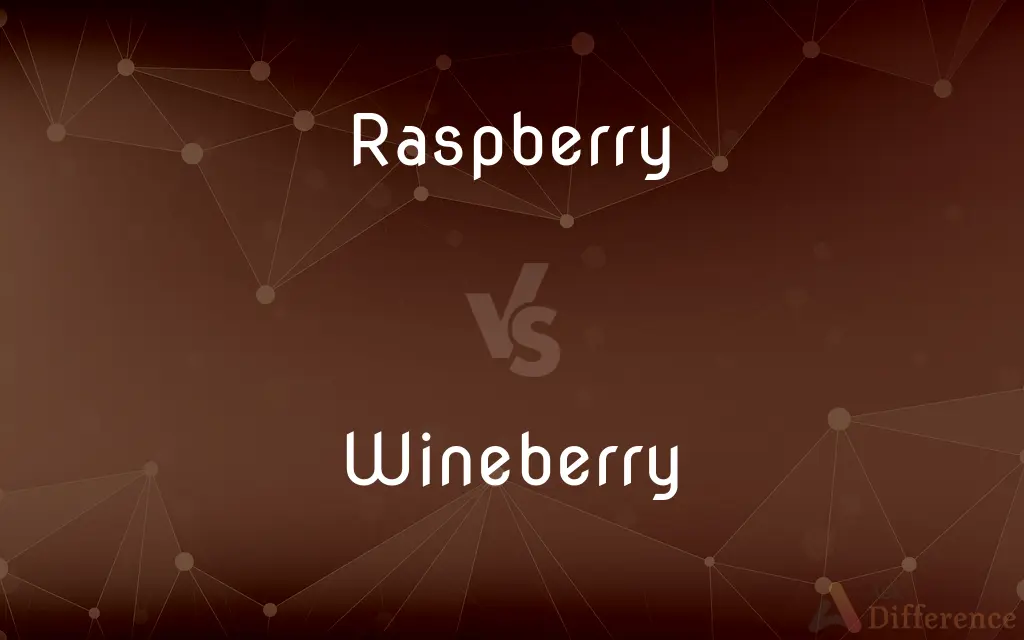Raspberry vs. Wineberry — What's the Difference?
By Urooj Arif & Fiza Rafique — Updated on March 27, 2024
Raspberries are known for their sweet-tart flavor, while wineberries are celebrated for their intense sweetness and slight tartness.

Difference Between Raspberry and Wineberry
Table of Contents
ADVERTISEMENT
Key Differences
Raspberries are a popular fruit globally, known for their distinctive flavor and nutritional benefits. They belong to the genus Rubus and are related to blackberries and dewberries. Wineberries, on the other hand, are a specific type of wild raspberry native to East Asia, also part of the Rubus genus. They are considered invasive in some parts of the United States, but are prized for their unique, rich flavor.
Raspberries come in several varieties, including red, black, and golden, each with its own specific taste profile and growing conditions. They are widely cultivated and used in a multitude of culinary applications, from fresh consumption to jams, desserts, and beverages. Wineberries are usually red and are not as widely cultivated, often harvested from the wild. Their berries are smaller and have a more intense flavor, making them a favorite for foraging.
In terms of cultivation, raspberries require well-drained soil and adequate sunlight, with some varieties needing support structures for growth. They can be more susceptible to diseases and pests than wineberries. Wineberries, being more robust, can thrive in a variety of soil types and conditions, often spreading aggressively in areas where they are considered invasive.
Nutritionally, both raspberries and wineberries are rich in vitamins, minerals, and antioxidants, though specific nutritional content can vary. Raspberries are particularly noted for their high fiber content and vitamin C, while wineberries are also rich in antioxidants, with research suggesting they may have higher levels of certain beneficial compounds.
The culinary uses of raspberries are extensive, known for their versatility in both sweet and savory dishes. They are a staple in baking, jams, and as a fresh topping. Wineberries, while less commonly found in commercial products, are highly valued in gourmet and foraging circles for their intense flavor, often used in similar ways to raspberries but considered a special treat due to their less common availability.
ADVERTISEMENT
Comparison Chart
Botanical Classification
Part of the Rubus genus.
A wild variety of the Rubus genus.
Color Varieties
Red, black, golden.
Primarily red.
Cultivation
Requires well-drained soil, prone to pests.
Robust, can be invasive, less prone to pests.
Flavor
Sweet-tart, varies by variety.
Intensely sweet with a slight tartness.
Culinary Uses
Jams, desserts, fresh consumption.
Foraging, gourmet dishes, jams.
Nutritional Value
High in fiber, vitamin C.
Rich in antioxidants, possibly higher in certain compounds.
Availability
Widely cultivated and available.
Less commonly cultivated, often foraged.
Compare with Definitions
Raspberry
Comes in red, black, and golden types, each with unique tastes.
Golden raspberries are a rare treat with a slightly sweeter taste than the red variety.
Wineberry
While considered invasive in some regions, its berries are highly sought after.
Despite its invasive nature, wineberry patches are a cherished find for foragers.
Raspberry
Used in a wide range of dishes, from desserts to savory sauces.
A raspberry coulis is a perfect topping for cheesecake.
Wineberry
Known for its intense sweetness and slight tartness, making it a forager's favorite.
Wineberries picked fresh off the vine can add a burst of flavor to any dish.
Raspberry
Requires specific conditions to thrive, including support structures.
Gardeners often use trellises to support raspberry plants.
Wineberry
Thrives in a variety of conditions without much care.
Wineberry plants can easily take over garden spaces if not carefully managed.
Raspberry
Widely enjoyed for its sweet-tart flavor and nutritional benefits.
Raspberries are a delicious addition to a summer fruit salad.
Wineberry
Prized in gourmet cooking for its unique flavor profile.
Wineberries make an exquisite filling for homemade pastries and jams.
Raspberry
Offers a good source of dietary fiber, vitamins, and antioxidants.
Eating raspberries can contribute to daily vitamin C intake.
Wineberry
Believed to contain high levels of beneficial antioxidants.
Wineberries are not only tasty but also offer nutritional benefits.
Raspberry
The raspberry is the edible fruit of a multitude of plant species in the genus Rubus of the rose family, most of which are in the subgenus Idaeobatus. The name also applies to these plants themselves.
Wineberry
Wineberry may refer to the following plants:
Raspberry
Any of various shrubby, usually prickly plants of the genus Rubus of the rose family that bear edible fruit, especially R. idaeus of eastern North America and Eurasia.
Wineberry
The plant Rubus phoenicolasius, the Japanese wineberry.
Raspberry
The aggregate fruit of any of these plants, consisting of many small, fleshy, usually red drupelets.
Wineberry
Its edible fruit, resembling a raspberry.
Raspberry
A moderate to dark or deep purplish red.
Wineberry
The tree Aristotelia serrata, endemic to New Zealand, with broad rose-coloured leaves.
Raspberry
(Slang)A derisive or contemptuous sound made by vibrating the extended tongue and the lips while exhaling.
Wineberry
Its edible fruit, a small black berry.
Raspberry
The plant Rubus idaeus.
Wineberry
The red currant.
Raspberry
Any of many other (but not all) species in the genus Rubus.
Wineberry
The red currant.
Raspberry
The juicy aggregate fruit of these plants.
Wineberry
Raspberry of China and Japan having pale pink flowers grown for ornament and for the small red acid fruits
Raspberry
A red colour, the colour of a ripe raspberry.
Wineberry
Graceful deciduous shrub or small tree having attractive foliage and small red berries that turn black at maturity and are used for making wine
Raspberry
(colloquial) A noise intended to imitate the passing of flatulence, made by blowing air out of the mouth while the tongue is protruding from and pressed against the lips, or by blowing air through the lips while they are pressed firmly together or against skin, used humorously or to express derision.
Raspberry
A cripple.
Raspberry
Containing or having the flavor/flavour of raspberries.
Raspberry
(color) Of a dark pinkish red.
Raspberry
To gather or forage for raspberries.
Raspberry
(colloquial) To make the noise intended to imitate the passing of flatulence.
Raspberry
The thimble-shaped fruit of the Rubus Idæus and other similar brambles; as, the black, the red, and the white raspberry.
Raspberry
Woody brambles bearing usually red but sometimes black or yellow fruits that separate from the receptacle when ripe and are rounder and smaller than blackberries
Raspberry
Red or black edible aggregate berries usually smaller than the related blackberries
Raspberry
A cry or noise made to express displeasure or contempt
Common Curiosities
Are wineberries safe to eat?
Yes, wineberries are safe to eat and are sought after for their rich flavor.
What are the nutritional benefits of raspberries and wineberries?
Both are high in vitamins, minerals, and antioxidants, with raspberries noted for fiber and vitamin C, and wineberries for their antioxidant properties.
Can wineberries be cultivated like raspberries?
While possible, wineberries are less commonly cultivated due to their invasive nature and robust growing conditions.
Where can wineberries be found?
Wineberries are native to East Asia but can be found in the wild in various parts of the United States, often in forested areas or along edges of fields.
What distinguishes raspberries from wineberries?
Raspberries come in various colors and are widely cultivated, while wineberries are primarily red, wild, and known for their intense flavor.
How can raspberries and wineberries be used in cooking?
Both can be used in jams, desserts, and fresh consumption, though wineberries are especially prized in gourmet dishes.
Are there any specific recipes that highlight the flavor of wineberries?
Wineberries can be used similarly to raspberries in recipes, but their unique flavor is especially highlighted in simple preparations like jams or toppings for desserts.
Why are wineberries considered invasive?
Wineberries can spread aggressively, outcompeting native plants in some regions.
Can raspberries and wineberries grow in the same garden?
While they can coexist, care must be taken to manage the growth of wineberries to prevent them from becoming invasive.
How do the flavors of raspberries and wineberries compare?
Raspberries have a sweet-tart flavor that varies by type, while wineberries offer an intense sweetness with a slight tartness.
Share Your Discovery

Previous Comparison
Komondor vs. Puli
Next Comparison
Raincoat vs. JerkinAuthor Spotlight
Written by
Urooj ArifUrooj is a skilled content writer at Ask Difference, known for her exceptional ability to simplify complex topics into engaging and informative content. With a passion for research and a flair for clear, concise writing, she consistently delivers articles that resonate with our diverse audience.
Co-written by
Fiza RafiqueFiza Rafique is a skilled content writer at AskDifference.com, where she meticulously refines and enhances written pieces. Drawing from her vast editorial expertise, Fiza ensures clarity, accuracy, and precision in every article. Passionate about language, she continually seeks to elevate the quality of content for readers worldwide.
















































